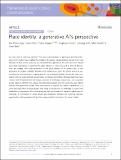Place identity: a generative AI’s perspective
Author(s)
Jang, Kee Moon; Chen, Junda; Kang, Yuhao; Kim, Junghwan; Lee, Jinhyung; Duarte, Fabio; Ratti, Carlo; ... Show more Show less
DownloadPublished version (3.717Mb)
Publisher with Creative Commons License
Publisher with Creative Commons License
Creative Commons Attribution
Terms of use
Metadata
Show full item recordAbstract
Do cities have a collective identity? The latest advancements in generative artificial intelligence (AI) models have enabled the creation of realistic representations learned from vast amounts of data. In this study, we test the potential of generative AI as the source of textual and visual information in capturing the place identity of cities assessed by filtered descriptions and images. We asked questions on the place identity of 64 global cities to two generative AI models, ChatGPT and DALL·E2. Furthermore, given the ethical concerns surrounding the trustworthiness of generative AI, we examined whether the results were consistent with real urban settings. In particular, we measured similarity between text and image outputs with Wikipedia data and images searched from Google, respectively, and compared across cases to identify how unique the generated outputs were for each city. Our results indicate that generative models have the potential to capture the salient characteristics of cities that make them distinguishable. This study is among the first attempts to explore the capabilities of generative AI in simulating the built environment in regard to place-specific meanings. It contributes to urban design and geography literature by fostering research opportunities with generative AI and discussing potential limitations for future studies.
Department
Massachusetts Institute of Technology. Department of Urban Studies and Planning; Senseable City LaboratoryJournal
Humanities and Social Sciences Communications
Publisher
Springer Science and Business Media LLC
Citation
Jang, K.M., Chen, J., Kang, Y. et al. Place identity: a generative AI’s perspective. Humanit Soc Sci Commun 11, 1156 (2024).
Version: Final published version